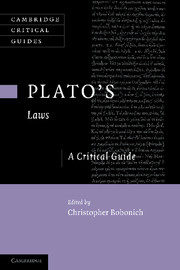Book contents
- Frontmatter
- Contents
- List of contributors
- Introduction
- 1 The Laws' two projects
- 2 The relationship of the Laws to other dialogues: A proposal
- 3 Ordinary virtue from the Phaedo to the Laws
- 4 Virtue and law in Plato
- 5 Morality as law and morality in the Laws
- 6 Puppets on strings: Moral psychology in Laws Books 1 and 2
- 7 Psychology and the inculcation of virtue in Plato's Laws
- 8 Images of irrationality
- 9 Family and the question of women in the Laws
- 10 The theology of the Laws
- 11 Plato's ‘truest tragedy’: Laws Book 7, 817a–d
- Bibliography
- Index
1 - The Laws' two projects
Published online by Cambridge University Press: 06 December 2010
- Frontmatter
- Contents
- List of contributors
- Introduction
- 1 The Laws' two projects
- 2 The relationship of the Laws to other dialogues: A proposal
- 3 Ordinary virtue from the Phaedo to the Laws
- 4 Virtue and law in Plato
- 5 Morality as law and morality in the Laws
- 6 Puppets on strings: Moral psychology in Laws Books 1 and 2
- 7 Psychology and the inculcation of virtue in Plato's Laws
- 8 Images of irrationality
- 9 Family and the question of women in the Laws
- 10 The theology of the Laws
- 11 Plato's ‘truest tragedy’: Laws Book 7, 817a–d
- Bibliography
- Index
Summary
ARISTOTLE'S PUZZLE
Plato's Laws has probably been the most unpopular of all his dialogues. ‘Not only’, says the Loeb editor in his introduction, ‘does it lack the charm and vigour of the earlier dialogues, but it is marked also by much uncouthness of style, and by a tendency to pedantry, tautology and discursive garrulity which seems to point to the failing powers of the author.’ It represents itself as the record of a rambling conversation, ‘framed apparently on no artistic plan’, between three elderly men, who get immersed in masses of detail often of little general philosophical interest. Damning remarks of this and other kinds can be found without difficulty in modern literature about Plato.
On a first inspection Aristotle might appear to stand at the head of the queue of those thinkers who on reading the Laws have found little there to reward them. The last chapter of his Nicomachean Ethics is devoted to an explanation of why law is an essential instrument for shaping the characters and behaviour of citizens, and of what sort of knowledge and experience someone needs to become a good legislator. His concluding paragraph begins with the notorious comment (EN 10.9, 1181b12–14): ‘Our predecessors have left the topic of legislation unresearched, so it would probably be better to study it instead ourselves.’ Aristotle's remark here makes it sound as though he has temporarily forgotten even the existence of the Laws.
- Type
- Chapter
- Information
- Plato's 'Laws'A Critical Guide, pp. 12 - 28Publisher: Cambridge University PressPrint publication year: 2010

